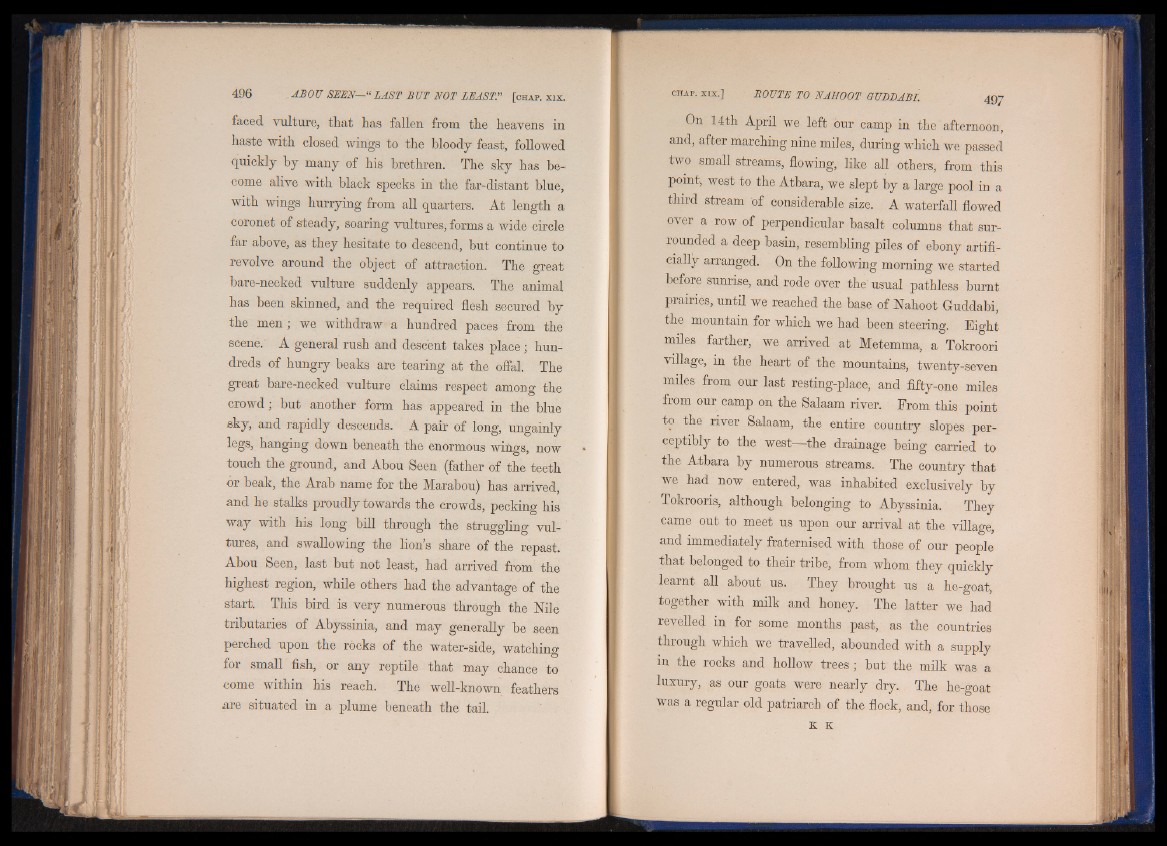
faced vulture, that has fallen from the heavens in
haste with closed wings to the bloody feast, followed
quickly by many of his brethren. The sky has become
alive with black specks in the far-distant blue,
with wings hurrying from all quarters. At length a
coronet of steady, soaring vultures, forms a wide circle
far above, as they hesitate to descend, but continue to
revolve around the object of attraction. The . great
bare-necked vulture suddenly appears. The animal
has been skinned, and the required flesh secured by
the men; we withdraw a hundred paces from the
scene. A general rush and descent takes place; hundreds
of hungry beaks are tearing at the offal. The
great bare-necked vulture claims respect among the
crowd; but another form has appeared in the blue
sky, and rapidly descends. A pair of long, ungainly
legs, hanging down beneath the enormous wifigs, now
touch the ground, and Abou Seen (father of the teeth
or beak, the Arab name for the Marabou) has arrived,
and he stalks proudly towards the crowds, pecking his
way with his long bill through the struggling vultures,
and swallowing the lion’s share of the repast.
Abou Seen, last but not least, had arrived from the
highest region, while others had the advantage of the
start. This bird is very numerous through the Nile
tributaries of Abyssinia, and may generally be seen
perched upon the rocks of the water-side, watching
for small fish, or any reptile that may chance to
come within his reach. The well-known feathers
are situated in a plume beneath the tail.
On 14 th April we left our camp in the afternoon,
and, after marching nine mfies, during which we passed
two small streams, flowing, like all others, from this
point, west to the Atbara, we slept by a large pool in a
third stream of considerable size. A waterfall flowed
over a row of perpendicular basalt columns that surrounded
a deep basin, resembling piles of ebony artificially
arranged. On the following morning we started
before sunrise, and rode over the usual pathless burnt
prairies, until we reached the base of Nahoot Guddabi,
the mountain for which we had been steering. Eight
miles farther, we arrived at Metemma, a Tokroori
village, in the heart of the mountains, twenty-seven
miles from our last resting-place, and fifty-one miles
from our camp on the Salaam river. From this point
to the river Salaam, the entire country slopes perceptibly
to the west—the drainage being carried to
the Atbara by numerous streams. The country that
we had now entered, was inhabited exclusively by
Tokrooris, although belonging to Abyssinia. They
came out to meet us upon our arrival at the village,
and immediately fraternised with those of our people
that belonged to their tribe, from whom they quickly
learnt all about us. They brought us a he-goat,
together with milk and honey. The latter we had
revelled in for some months past, as the countries
through which we travelled, abounded with a supply
in the rocks and hollow trees; but the milk was a
luxury, as our goats were nearly dry. The he-goat
was a regular old patriarch of the flock, and, for those
K K